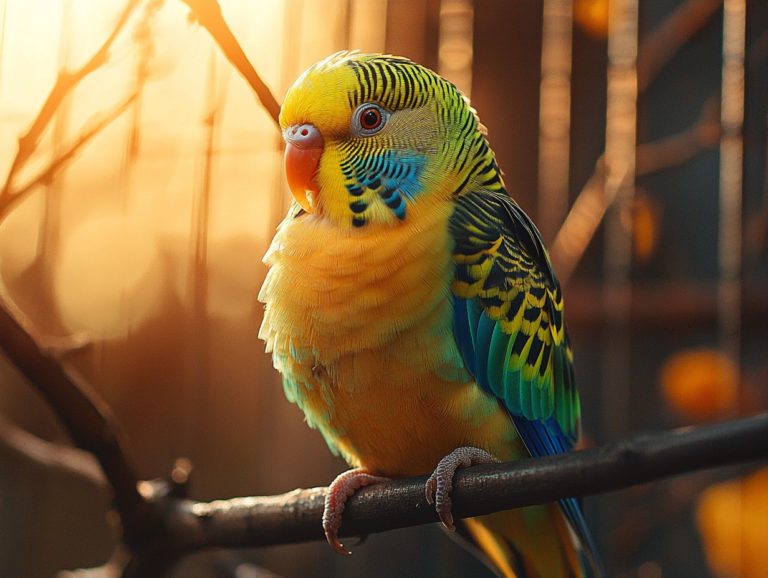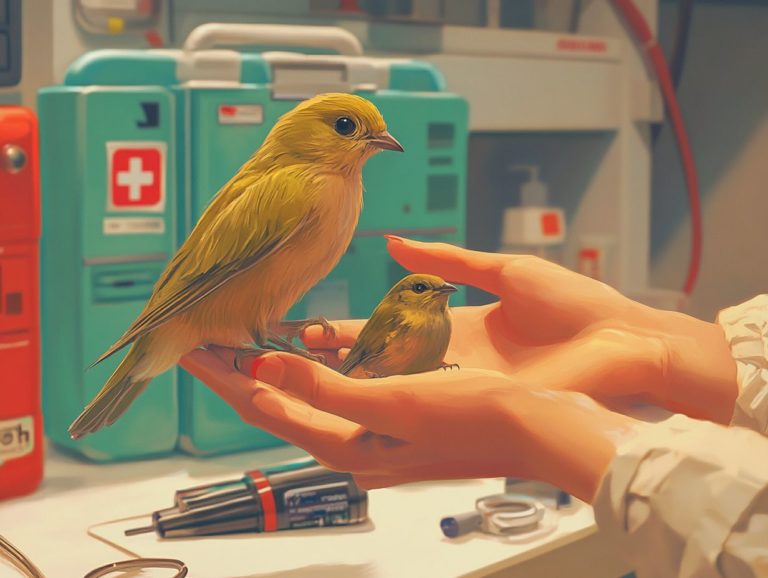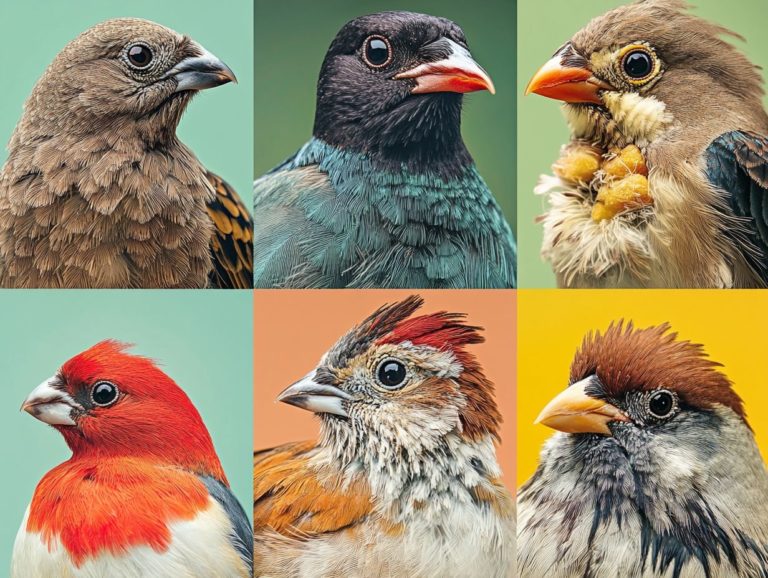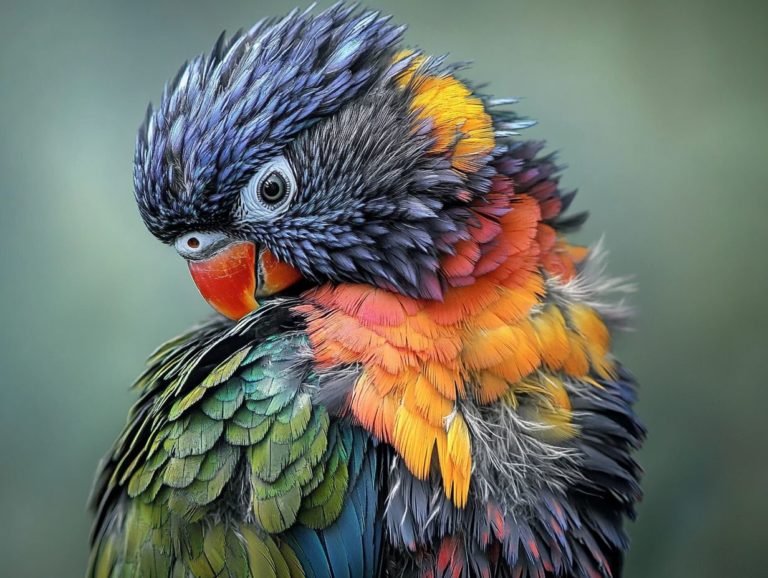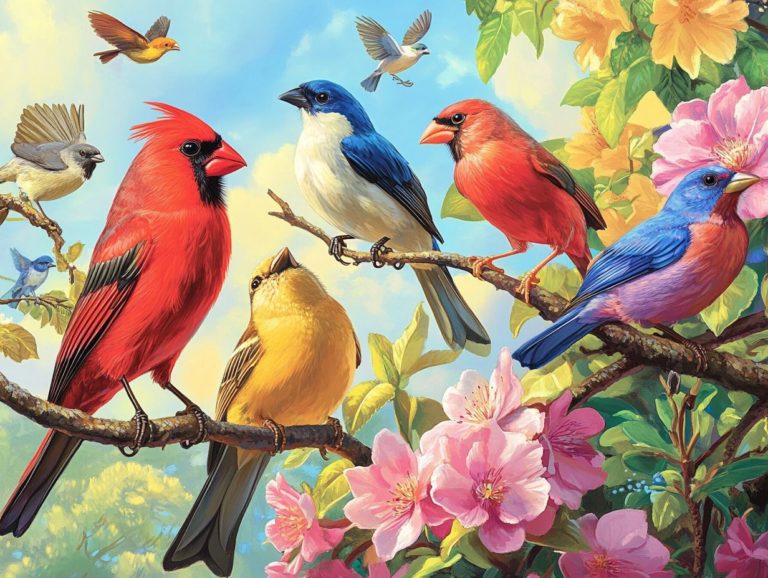How to Keep Your Bird Healthy and Happy
Ensuring your bird’s health is vital for their well-being and happiness. Like any cherished pet, your feathered companion requires attentive care, proper bird care, a nurturing environment, and the right amount of love to truly thrive.
This article delves into the signs of a healthy bird, highlights common health issues you should be vigilant about, and offers insights on creating a safe and stimulating habitat. We’ll cover optimal humidity levels and emphasize the significance of preventive measures, such as regular check-ups.
Discover the essentials for keeping your avian friend vibrant and joyful!
Contents
Key Takeaways:
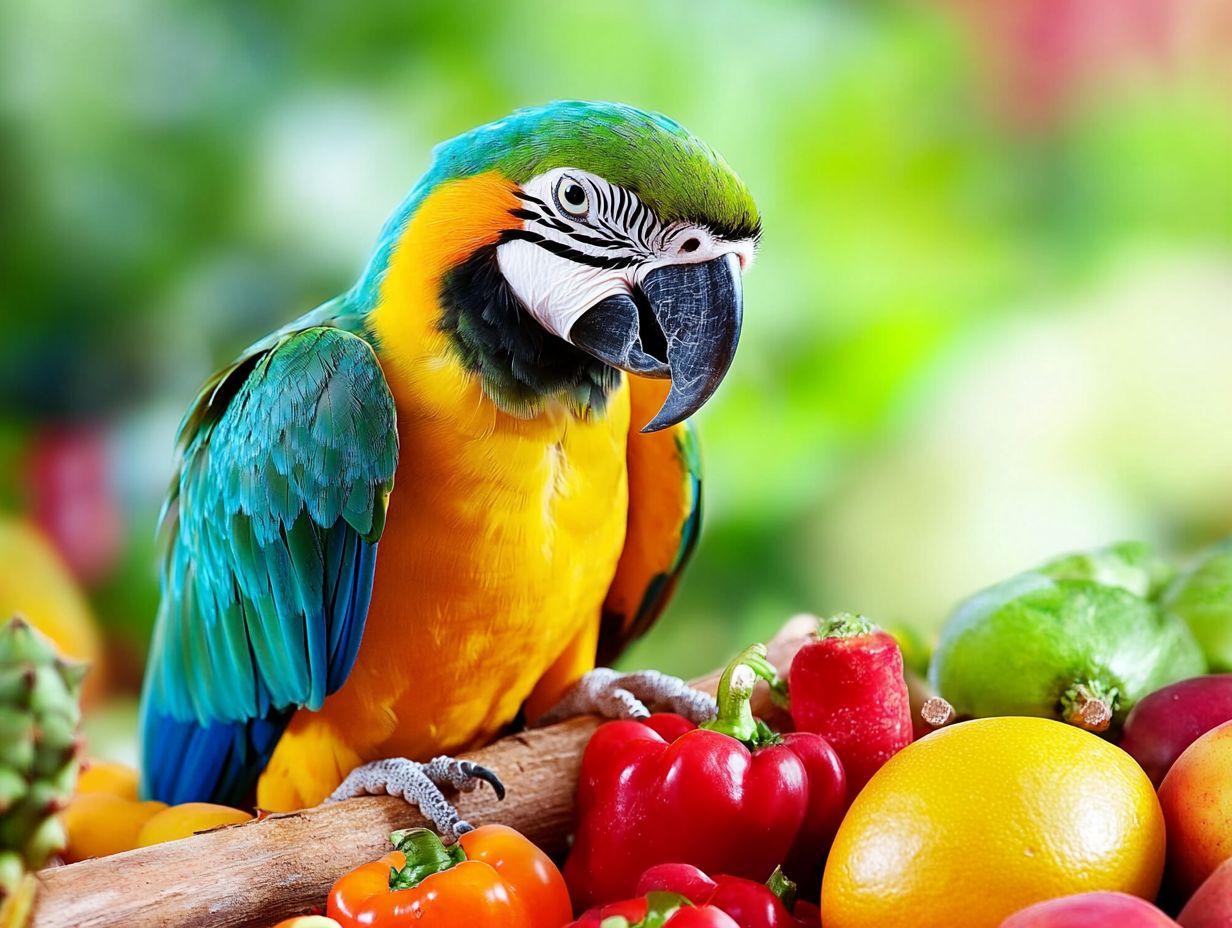
- Proper nutrition and hydration are essential for keeping your bird healthy and happy. Make sure to provide a balanced diet and plenty of fresh water to keep your feathered friend in top shape.
- Regular check-ups and vaccinations are key preventive measures for maintaining your bird’s health. Schedule routine check-ups with a bird vet clinic and keep up-to-date with necessary vaccinations to ensure your bird’s well-being.
- Exercise and mental stimulation are important for a happy and healthy bird. Provide your bird with plenty of opportunities to stretch its wings and engage in mentally stimulating activities to keep its body and mind active.
The Importance of Bird Health
Isn’t your bird’s health the most important thing to consider? Prioritizing proper bird and parrot care is essential in creating a nurturing environment where your birds can truly thrive, especially given their tropical origins and unique requirements.
Much like humans, birds need specific care and attention to lead fulfilling lives. This includes scheduling regular veterinary check-ups at reputable bird vet clinics to keep tabs on their overall health, including critical aspects like respiratory function.
Fostering a strong bond with your bird ensures emotional stability. A healthy bird creates a more vibrant and interactive pet experience, allowing you to forge deeper emotional connections.
Research indicates that pet birds thrive in environments where their health is prioritized. This leads to fewer behavioral issues and enhanced social interactions, especially when considering factors like humidity and a draft-free area. To ensure your finch is well-cared for, look out for the signs your finch is happy and healthy.
Did you know that birds receiving regular veterinary check-ups are 30% less likely to encounter severe health problems? This fosters a more joyful and engaging companionship!
By ensuring they have a balanced diet, proper exercise, and mental stimulation, including regular bathing, you play a crucial role in maintaining their avian health. For more tips on keeping your feathered friend happy, check out this guide on how to keep your pet bird engaged and healthy. These practices not only elevate their quality of life but also cultivate a mutual bond that enriches both your bird’s and your own experience.
Signs of a Healthy Bird
Recognizing the signs of a healthy bird is vital for any bird owner dedicated to ensuring their pet enjoys a vibrant and fulfilling life, particularly during the autumn season when birds may molt, or lose old feathers to grow new ones.
A healthy bird will engage in lively interactions, inhabit a clean and well-maintained space using bird-safe cleaning agents, and display no signs of stress or illness. Being aware of the top 10 signs of a healthy pet bird is essential, which is why regular check-ups at bird vet clinics become invaluable in your journey as a responsible bird owner.
Take a moment today to check your bird’s environment and ensure it s a healthy place for them to thrive!
Physical and Behavioral Indicators
Physical and behavioral indicators are essential metrics that can help you assess your bird’s health. This is crucial for its emotional well-being.
- Start by observing feather quality. Vibrant, smooth feathers typically signal a healthy bird, while dull or missing feathers may indicate stress or illness.
- Don t overlook body posture. A bird that perches upright and displays alert behavior is generally in better health than one that slouches or hides.
- Eating habits also provide vital clues. Consistent feeding patterns and enthusiasm for a varied diet are strong indicators of well-being.
- Pay attention to social interaction and vocalization. A chatty bird likely feels secure, while prolonged silence or aggressive behavior can signal anxiety or unease.
- Lastly, consider environmental factors. Proper habitat enrichment and a balanced diet greatly enhance the overall health and happiness of your feathered companion.
Common Health Issues in Birds
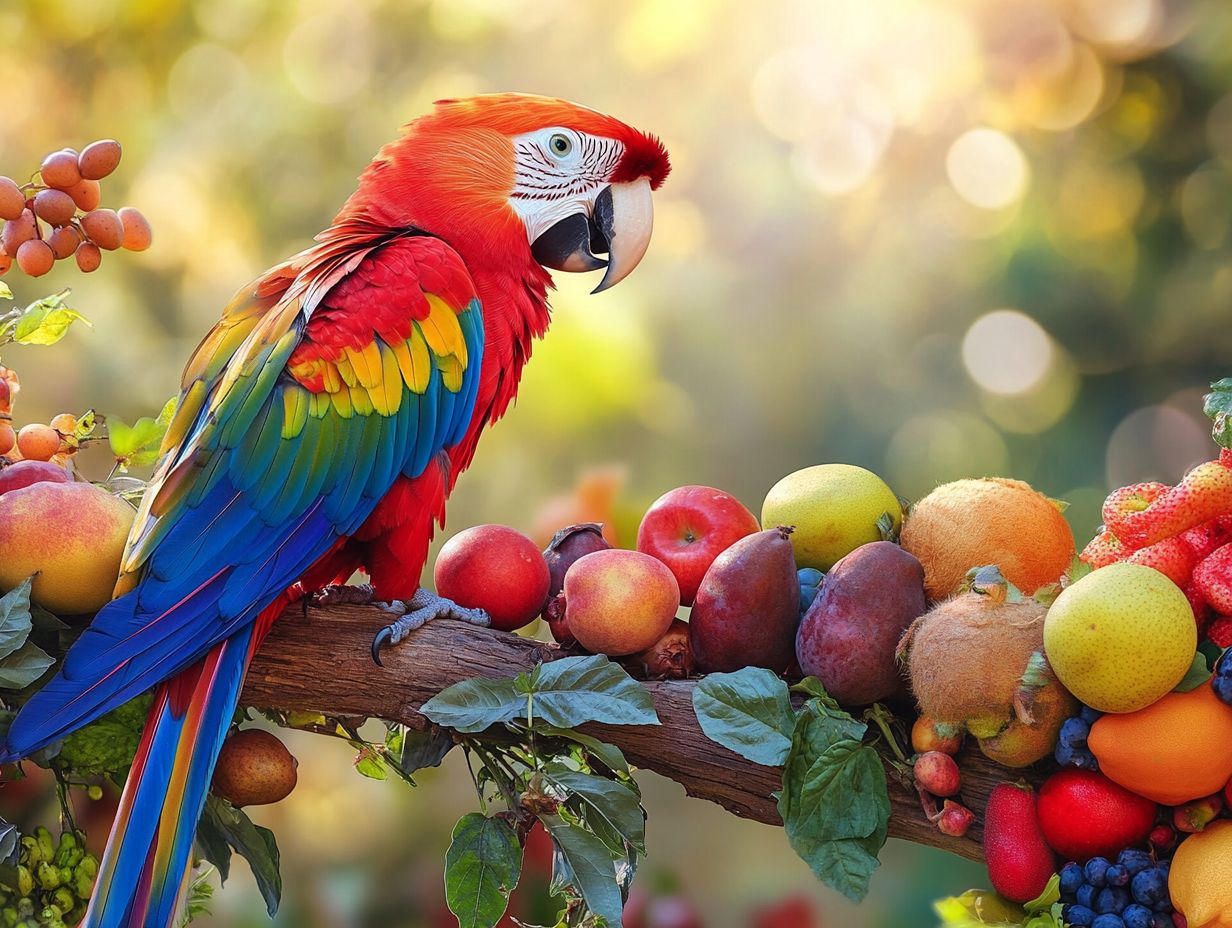
Understanding common health issues in birds is essential for you as an owner committed to providing exceptional care and support. Birds are vulnerable to a range of health concerns, such as respiratory infections and complications from inadequate nutrition during critical periods like fall molting.
Don’t wait! Regular visits to veterinary clinics for birds can catch health issues before they become serious problems. Early identification enables timely interventions that can significantly enhance your bird’s health and well-being.
Identifying and Addressing Common Problems
Identifying and addressing common health issues in birds requires your keen awareness and proactive involvement, especially when you learn how to support your bird’s recovery after illness.
Pay close attention to subtle shifts in behavior. Any changes in feeding habits, a decrease in vocalization, or unusual preening patterns could signal underlying problems related to respiratory health. Catching these signs early is invaluable in pinpointing potential issues, like respiratory infections or dietary deficiencies.
Consider keeping a journal to track any behavioral changes. This can be immensely helpful during veterinary consultations at avian vet clinics.
Introduce fresh fruits and vegetables, along with calcium, magnesium, and vitamin D3 for better health. Using bird-safe cleaning agents is also crucial for maintaining a hygienic environment. Ensure the products you select are free from harmful chemicals that could negatively impact your bird s sensitive respiratory system.
Creating a Healthy Environment for Your Bird
Your bird deserves a nurturing environment for its happiness and health! Begin with the right nourishment, including bird-friendly foods, and habitat management. Additionally, check out these seasonal health tips for your pet bird to ensure optimal care.
Your feathered friend needs specific humidity levels, a draft-free space, and bird-friendly foods to flourish and promote healthy feather growth.
Regular cleaning with bird-safe agents is essential for maintaining hygiene and preventing illness. This includes hazards from harmful houseplants, ensuring that your bird s cage is not just a home, but a vibrant sanctuary for your avian companion.
Proper Nutrition and Hydration
Proper nutrition and hydration are essential for ensuring the health and longevity of your bird. It’s important to provide bird-friendly foods rich in vital nutrients.
A well-balanced diet goes beyond just seeds and pellets. Include sources of calcium, magnesium, and vitamin D3 for optimal health. These minerals are crucial for maintaining strong bones and supporting metabolic processes. Calcium is vital for nerve function and muscle contraction, while magnesium significantly aids in energy production. Vitamin D3 is critical for calcium absorption, essential for optimal skeletal health.
Equally important is ensuring your feathered friend stays hydrated. Always provide fresh, clean water. To keep their diet vibrant and nutritious, consider incorporating fresh fruits, vegetables, whole grains, and specialized avian supplements. Additionally, to ensure a healthy living environment, learn how to maintain a clean bird cage. This approach creates a health-boosting menu that will keep your bird thriving.
Exercise and Mental Stimulation
Exercise and mental stimulation are important parts of a healthy lifestyle for your bird. They greatly enhance its overall well-being.
Incorporating various activities keeps your bird physically fit and sharpens its mind. Simple exercises like flying to different perches or climbing ropes can be both fun and effective.
Introducing toys such as puzzles and foraging devices stimulates their problem-solving skills, creating an enriching environment. This challenges both their bodies and minds, improving their training. A well-designed bird cage filled with engaging items and different levels for exploration is crucial for keeping your pet active and mentally engaged, leading to a happier, healthier life.
Preventive Measures for Bird Health
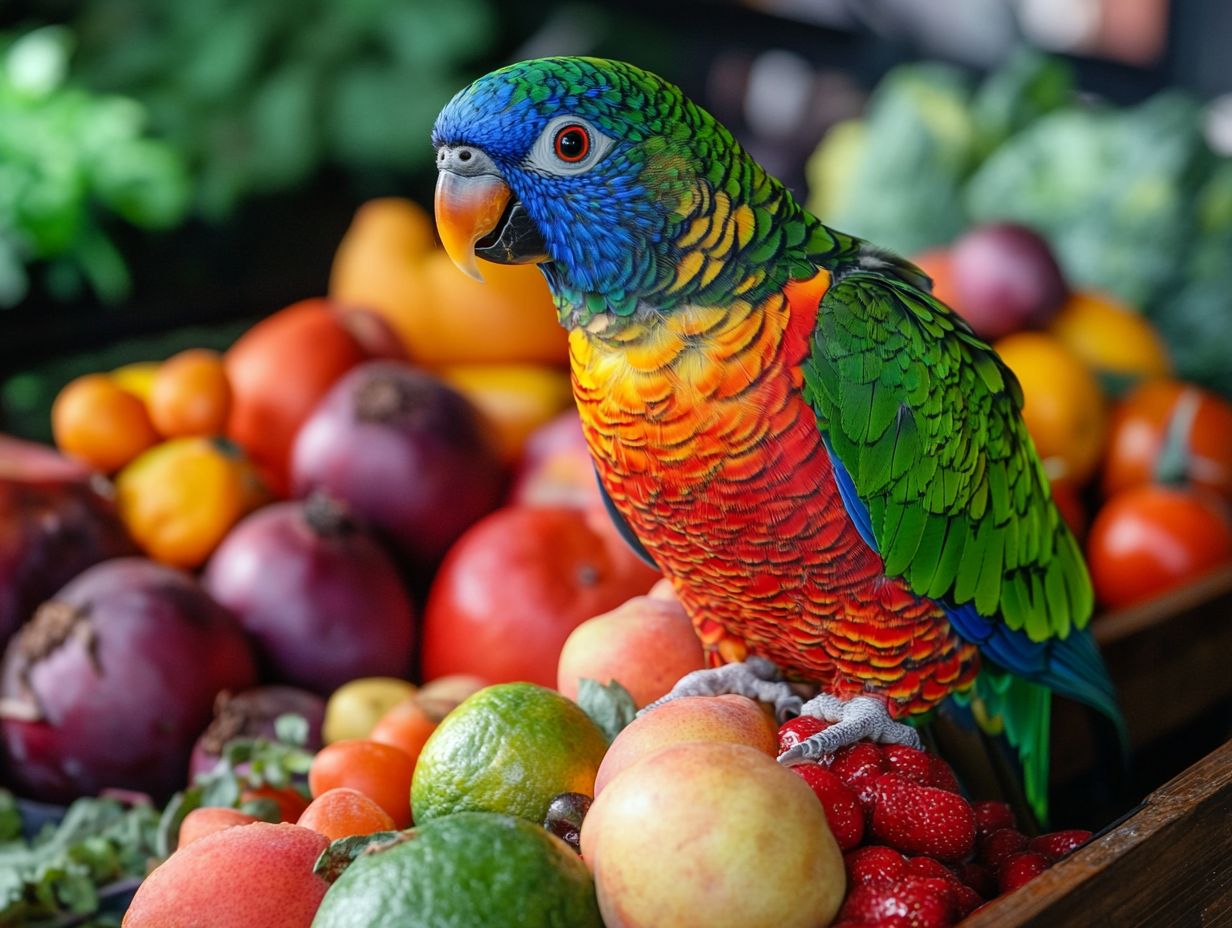
Implementing preventive measures for your bird’s health is essential to minimize common health issues. This ensures your feathered friend remains vibrant and active. For those with lovebirds, following a lovebird lifestyle can significantly contribute to their overall well-being and vitality.
Regular Check-Ups and Vaccinations
Regular check-ups and vaccinations at avian vet clinics are vital for your bird’s respiratory health and overall condition. By prioritizing these appointments, you can monitor your feathered companions’ health closely and catch illnesses early.
During these visits, expect a thorough examination that evaluates your bird’s weight, feather quality, and behavior. Vaccinations for avian influenza, a type of bird flu, and polyomavirus, a virus affecting young birds, play a critical role in safeguarding your bird against diseases.
Regular check-ups strengthen your bond with your pet and provide essential education on proper care, diet, and early detection strategies that help maintain your bird’s long-term health.
Preventing Common Health Issues
Preventing common health issues in birds is within your control through effective preventive measures, proper nutrition, and a clean environment, as well as understanding how to maintain a bird’s mental health.
As a bird owner, it s essential to adopt strategies that prioritize the health of your feathered companions. A balanced diet rich in seeds, fruits, and vegetables supports their health and boosts their immune system. Choosing bird-safe cleaning agents helps eliminate harmful bacteria and toxins from their living space while protecting their delicate respiratory systems.
By scheduling regular veterinary check-ups and observing their routines, you can significantly reduce the likelihood of illnesses. Integrating these dietary recommendations and cleaning practices creates a thriving, healthy environment for your beloved pets.
Frequently Asked Questions
How can I ensure my bird is getting the right nutrition?
Providing your bird with a balanced diet is crucial. It should include a variety of fresh fruits, vegetables, seeds, and pellets. Consult with a veterinarian or research the specific dietary needs of your bird species, including the importance of calcium, magnesium, and vitamin D3 for their health.
What are some signs that my bird is healthy and happy?
A healthy and happy bird will have bright, alert eyes and clean feathers. They should also have a good appetite and be active and vocal.
Engaging in normal behaviors like preening and playing is also a good sign. Regular observation can help you monitor their overall well-being.
How often should I clean my bird’s cage?
Clean your bird’s cage at least once a week. Spot clean any messes or soiled areas throughout the week.
This helps maintain a clean and healthy environment for your bird, especially during fall molting.
Can I train my bird to do tricks?
Absolutely! You can train your bird to do fun tricks like stepping up onto your finger or flying to a designated perch.
Use positive reinforcement techniques and be patient during the training process. Incorporating training your bird into their daily routine is a great way to enhance their companionship with you.
Is it necessary to take my bird to the vet regularly?
Yes, just like any other pet, you should take your bird to the vet for regular check-ups at veterinary clinics that specialize in birds.
This ensures that any potential health issues are caught early and treated effectively.
How can I keep my bird mentally stimulated and entertained?
There are many ways to keep your bird mentally stimulated and entertained. Provide them with bird-friendly foods, toys, puzzles, and foraging activities.
Rotate their toys and rearrange their cage to keep things interesting. Consider adding an enriching bird cage setup for additional stimulation!

